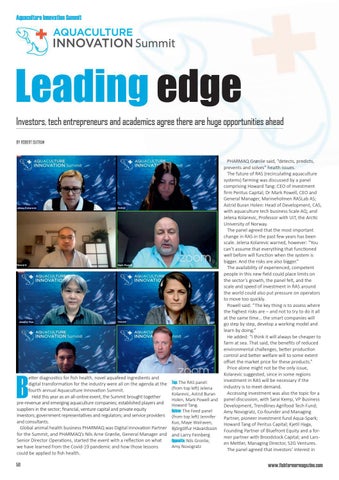Aquaculture Innovation Summit
Leading edge
Investors, tech entrepreneurs and academics agree there are huge opportunities ahead BY ROBERT OUTRAM
B
e�er diagnos�cs for fish health, novel aquafeed ingredients and digital transforma�on for the industry were all on the agenda at the fourth annual Aquaculture Innova�on Summit. Held this year as an all-online event, the Summit brought together pre-revenue and emerging aquaculture companies; established players and suppliers in the sector; financial, venture capital and private equity investors; government representa�ves and regulators; and service providers and consultants. Global animal health business PHARMAQ was Digital Innova�on Partner for the Summit, and PHARMAQ’s Nils Arne Grønlie, General Manager and Senior Director Opera�ons, started the event with a reflec�on on what we have learned from the Covid-19 pandemic and how those lessons could be applied to fish health.
50
Aquaculture Innovation Summit.indd 50
Top: The RAS panel: (from top le�) Jelena Kolarevic, Astrid Buran Holen, Mark Powell and Howard Tang. Below: The Feed panel (from top le�) Jennifer Kuo, Maye Walraven,
Björgólfur Hávardsson and Larry Feinberg Opposite: Nils Gronlie, Amy Novogratz
PHARMAQ Grønlie said, “detects, predicts, prevents and solves” health issues. The future of RAS (recircula�ng aquaculture systems) farming was discussed by a panel comprising Howard Tang: CEO of investment firm Peritus Capital; Dr Mark Powell, CEO and General Manager, Marineholmen RASLab AS; Astrid Buran Holen: Head of Development, CAS, with aquaculture tech business Scale AQ; and Jelena Kolarevic, Professor with UiT, the Arc�c University of Norway. The panel agreed that the most important change in RAS in the past few years has been scale. Jelena Kolarevic warned, however: “You can’t assume that everything that func�oned well before will func�on when the system is bigger. And the risks are also bigger.” The availability of experienced, competent people in this new field could place limits on the sector’s growth, the panel felt, and the scale and speed of investment in RAS around the world could also put pressure on operators to move too quickly. Powell said: “The key thing is to assess where the highest risks are – and not to try to do it all at the same �me… the smart companies will go step by step, develop a working model and learn by doing.” He added: “I think it will always be cheaper to farm at sea. That said, the benefits of reduced environmental challenges, be�er produc�on control and be�er welfare will to some extent offset the market price for these products.” Price alone might not be the only issue, Kolarevic suggested, since in some regions investment in RAS will be necessary if the industry is to meet demand. Accessing investment was also the topic for a panel discussion, with Sarai Kemp, VP Business Development, Trendlines Agrifood Tech Fund; Amy Novogratz, Co-founder and Managing Partner, pioneer investment fund Aqua-Spark; Howard Tang of Peritus Capital; Kje�l Haga, Founding Partner of Bluefront Equity and a former partner with Broodstock Capital; and Larsen Me�ler, Managing Director, S2G Ventures. The panel agreed that investors’ interest in
www.fishfarmermagazine.com
12/10/2021 15:32:47













